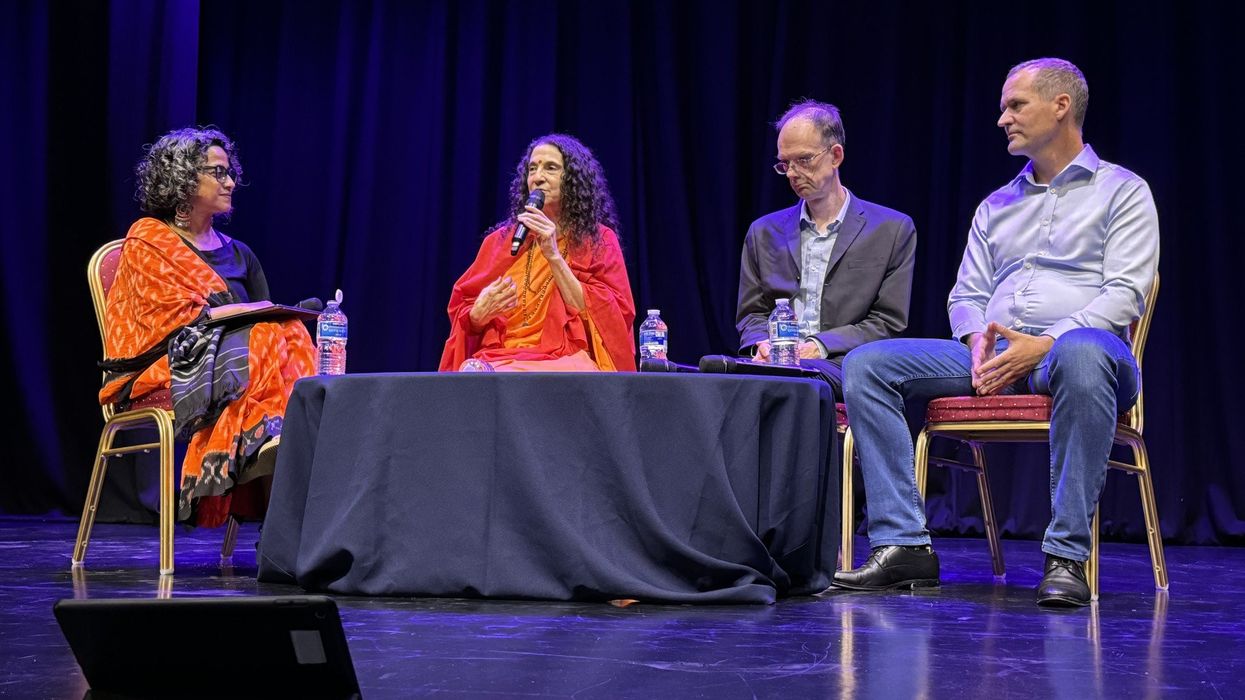RENOWNED spiritual leader and social activist Sadhvi Bhagawati Saraswati shared her own history of mental health journey as she explained that finding “peace within us” is key making “impactful change” to society.
Originally from Los Angeles, Sadhviji graduated from Stanford University with a PhD in psychology. She has lived in north India, on the banks of the holy River Ganga, for 25 years while engaged in spiritual and community service.
In her memoir, Hollywood to the Himalayas: A Journey of Healing and Transformation, she recalled how her spiritual awakening led her to overcome her mental health struggles.
“As someone who in the first 25 years of her life suffered a lot of personal trauma, abuse, depression, an eating disorder and addiction, to someone who now, through just incredible blessings and grace and the power of spirituality and the power of what we call in Sanskrit culture, dharma, has actually been pulled out of that suffering into freedom and joy,” she said.
“All of us, if we tapped into our hearts and our humanity, want there to be peace in the world. There’s no one whose heart is open, who can look at what’s happening in the world and not be impacted to want to act and bring about change, and yet we cannot bring about impactful change unless we find that peace within us.”
Sadhviji was speaking at an event hosted by the Asian Media Group (AMG), publishers of Eastern Eye newspaper, titled GG2 Leadership Talk – Empowering Minds: Building Mental Health Resilience.
She was joined on the panel discussion by Poppy Jaman, founder of Mind Forward Alliance; Andy Bell, chief executive, Centre for Mental Health; and Peter Rodgers, deputy general counsel, KPMG.
Bell revealed that population data from the UK as well as many other western countries, shows that people from black, Asian and other racialised groups, have higher levels of mental ill health than the white population.
“There’s nothing inevitable about it, it’s nothing about being from a certain community, but it comes from experiences of marginalisation, discrimination, unfair treatment,” said Bell.
Bhavit Mehta welcomes guests and introduces the panel discussion“What puts people’s mental health at risk is about inequality and injustice. Whenever you see higher levels of wealth inequality, for example, you see higher levels of mental ill health. When you see experiences of violence and mistreatment, for example, on gender lines, you see higher levels of mental ill health. It’s really important we see our mental health as being a function of the lives we’ve lived and the experiences we’ve had and the environments we’re in, rather than it being something about us, a quality in us.”
Jaman said it was crucial the south Asian community understood the importance of environmental factors involved in mental health in order to tackle the stigma of the subject.
“There is this idea that somehow we’re doomed, we’re we’ve got a hereditary thing, and therefore we should be ashamed, and it should actually be hidden away, because people might think, ‘well, in this family there’s mental illness, and therefore we shouldn’t connect with that family or that individual’.
“That’s all incorrect and it’s one of the things that actually causes the stigma and shame around mental health that we really need to be thinking about today, and not just individually, but as communities.”
Sadhviji has lived in the Parmarth Niketan Ashram in Rishikesh for the past 28 years. Her teachings have helped transform people’s lives. “We (India) are a population of ‘let’s sweep it under the rug’. Put up this face of everything is perfect, as though somehow our highest dharma is to take care of what are the neighbours going to think?” she said.
“The number of lives I have seen ruined is a perhaps too strong word, but really negatively impacted, thwarted by a system and a society and culture that puts so much energy around an externally projected identity rather than an internally healthy identity.
“A lot of mental health issues we’re seeing didn’t begin as mental health issues, they began as life struggles – there are ups and downs in life. It’s the nature of nature.
An audience member asking a question“When you are immigrants, when you’re dealing with discrimination, when you’re dealing with inequality, when you’re dealing with poverty, when you’re dealing with loss, these are things, of course, that are difficult to deal with, but if I’m not allowed to say to you, ‘oh, my god, I’m having such a hard day, could I just come over and cry on your (the neighbour’s) shoulder? Or can you just listen for a moment while I tell you about this awful day I had at work where everybody discriminated against me’ - if I can’t do that because they’re (the neighbours) not going to be jealous of me anymore, they’re not going to think, ‘this family has it all’. That’s going to fester within me.
“Any medical doctors in the audience know what happens if you’ve got even a small wound that doesn’t get treated, you lose limbs, you lose your life.”
Jaman spoke openly about how her mental health struggles stemmed from a forced marriage. “My Asian, my Bangladeshi identity, has also been quite harmful, in many ways. The forced marriage resulted in quite significant mental health issues,” she said.
“But I also think migrated communities, like the south Asian community and the colonial era, the divide and all of that politics, social change that happened in our immediate history is being passed down – it’s not just the environmental factors around you now, it’s the stuff that you’ve inherited that’s not tangible.”
Bell has been working with a group of researchers who spoke to parents and children from racialised backgrounds in south London about their experience of intergeneration trauma.
“It’s unsurprising that parents whose children are experiencing racism in school feel the trauma from that. And they try to help their children to heal and to find ways to manage that trauma,” he said.
“The positive we need to take from this is, while trauma happens to us, adversities happen to us, many people are exposed to far too many. But it’s the communities we live in, the families that nurture us, the groups of people, even online groups of people we belong to, or the neighbourhood groups or groups we identity with, places like this, can actually help to heal trauma.”
Rodgers said he suffered from periods of intense depression which started in his 30s. He reflected how he had been impacted by intergeneration trauma, revealing that his Estonian mother had been a refugee during the second world war.
Later, she tragically lost her brother to a car accident. His father’s family migrated to Australia from Ireland, where they were very poor.
Rodgers was one of the founders of Mind Forward Alliance alongside Jaman. His goal was to make mental health support accessible to people, especially in the workplace.
“I suffer from depression. I had a severe episode earlier this year and was off work,” he said.
Audience listening to the panelists“My employer has always been fantastic. The first time I had a really significant incident was back in my mid-30s, and I remember I was fortunate enough to be in a private healthcare facility, and I was observing the situation that almost all the people were afraid of what would happen. They sometimes were not telling their employers even the truth about what’s going on and that made me angry, because I didn’t experience that with my employer. And I thought, actually, everyone should feel the same way.”
Rodgers added that early support was crucial for someone struggling with their mental health.
“When it first happened to me, you don’t know what’s going on - it’s very confusing. You think it’s a normal reaction to a set of objective facts, but, actually, you don’t recognise, in a lot of cases, that you’re unwell and that actually you’ll get better as well.
“Unfortunately, things can go wrong when you don’t have that realisation, or you don’t have the support.”




